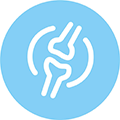Magnesium deficiency can occur when the need for it suddenly increases and the normal diet can no longer supply enough of it. This happens, for example, during pregnancy and breastfeeding, under stress, in old age or if a lot of water is lost – i.e. whenever more magnesium is excreted through heavy sweating, urination, vomiting or diarrhea. Persons who take certain medications for a long time are also at risk for magnesium deficiency. These medications are naturally diuretics, which also cause more magnesium to be carried out of the body. Moreover, patients who undergo chemotherapy with cytostatic drugs such as cisplatin or take corticoids excrete more magnesium. Patients with type 1 and type 2 diabetes are especially affected by magnesium deficiency. More than 60% of them are magnesium deficient because owing to their condition and medications, they flush out more minerals through the kidneys than healthy individuals – and thus magnesium as well. Persons who have HIV, cancer, and liver or pancreatic conditions, absorb less magnesium. Women who take oral contraceptives for a long time can also suffer from magnesium deficiency, and they are urged not to take magnesium simultaneously with the oral contraceptive. The reason is that an excessively high dose of magnesium is directly excreted once again, which can lead to diarrhea. If this happens when the oral contraceptive is only half digested, it cannot exert its full effect on that day. However, if attention is paid to the right dose of magnesium, there is no risk to influence the contraceptive’s effect.



